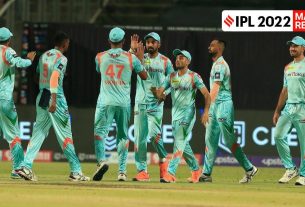His quick wit picked up by stump mics has earned Rishabh Pant a fan-following as much as his fearless batting. But before he became a household name, India’s latest star lived with the ‘outsider’ tag.
Rishabh Pant was named the ICC Emerging Player of the Year 2018. (Express Archive)
Rishabh Pant is sleeping in a bus. It’s 2.30 am and he is on his way to Delhi, a six-hour journey from Roorkee to play cricket. He is about 12. Beside him is his mother, with a flask of coffee that her son loves and paneer parathas in a tiffin box. Extra paneer stuffed, masala sprinkled on top – Pant still salivates when he talks about his childhood craving; comfort food during the bus rides on cold wintry nights.
In the capital city, Pant and his mother would find shelter in a Gurudwara at Motibagh where they would spend the night. In the morning Pant would practice at the Sonnet cricket academy where his guru Tarak Sinha would impart cricketing and life lessons. Then back to a bus. This was the weekend routine for quite some time before he moved to the capital. He would pop into one of the video-game parlours on and off when in Delhi, for a little downtime away from the grind of cricket.
“There were lots of such struggles in those days. My mother would not even sleep in the bus. Night bus journeys in India aren’t safe for women but she would make sure I get some sleep before practice.”
The Pants knew a few people in Delhi but even as a youngster, he was sure of one thing: “Mujhe kisi ka ehsaan nahi lena tha. (I didn’t want to seek favours). I didn’t want anyone to say, they did this and that for me. So my mother would go and see them in the day and go to Gurudwara. She used to do seva there – serving food and doing other things. Punya milta hai – blessings and good-wishes.”
Pant needed it at that time. His father was a manager at Hero Honda but had quit to start a business. “We lived in one room, me and my sister with parents.”
His father’s other great dream was to make Pant play cricket for India. When he was five, he remembers his father making him play cricket. At 8, arrived the biggest gift of his life – a Rs 14,000 SG bat from his father that hadn’t gone too well with the mother who was miffed about the expense. “I was very very happy. I remember I would touch it – it was such a special feeling to play with it.”
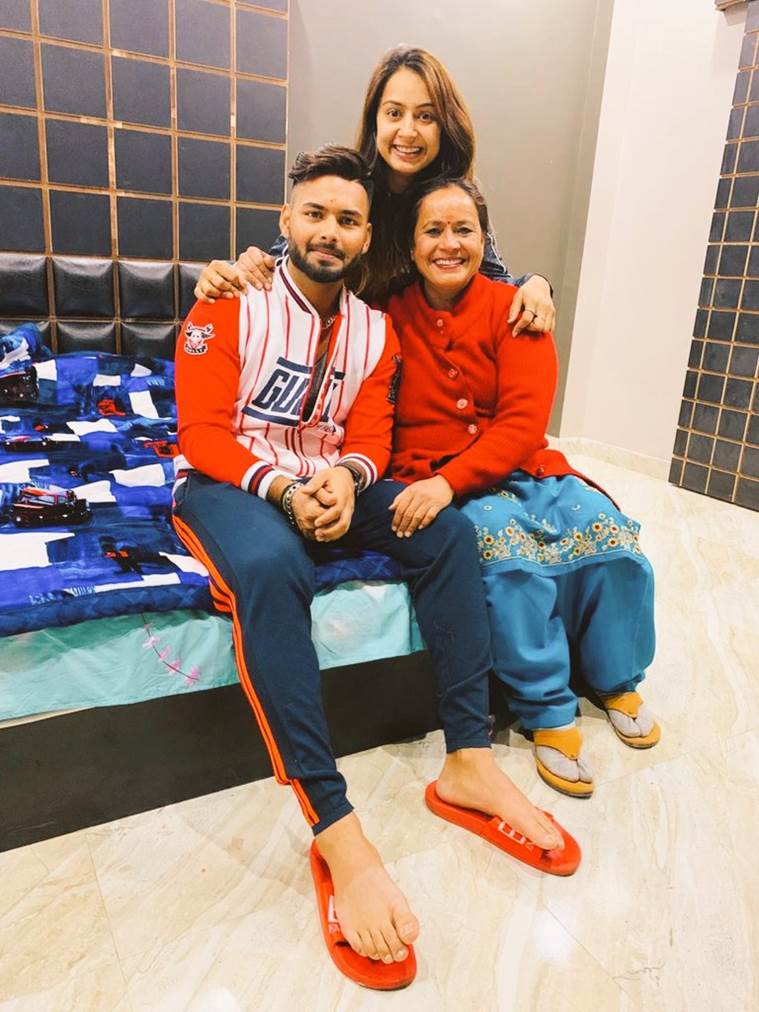
Pant with his mother Saroj and sister Sakshi. Instagram
It has a special place in Pant’s house even now. “The sticker is gone but it’s still there with me. A special gift from my father.”
All he remembers from his early years in Roorkee are the endless hours on cricket grounds in the small town where acres of space was available for playing. His cricket-loving father had played the game till the university level. “There wasn’t much support from his family. He told me he will support me – go and have fun playing. What more could I have asked for as a boy?”
The confidence one sees in Pant these days was instilled in his formative years when he ended up playing with older kids. “In fourth or fifth standard, I would be playing on matting tracks with teenagers. Roorkee and Uttarakhand didn’t have much structured cricket. There were open tournaments or school cricket may be. You had to play with older boys. I would be the man-of-the-series in 8 out of 10 tournaments.”
The nature of those tournaments also started to influence his aggressive style of play. “Our matches were all short. 10 overs or 12 overs, maximum 15. I had to get runs quickly as an opener. I would set a target that if I hit 50 runs, there should be a gap of 20 between the balls faced and runs scored. 30 balls 50, waisa.”
The clean-hitter with wonderful hand-eye coordination was in search of a trusted coach who would help him build on his strengths and not be impulsively dismissive of his big-hitting. In Sinha, the respected coach with an eye for spotting talent, Pant found the ideal tutor in Delhi. It proved to be a guru-shishya relationship which has stood the test of time. “Sir changed my life. Without him, I can’t even imagine what I would have done. Jo sir ney kaha, I did. Whatever he said. I just followed his advice – be it in my batting technique or where should I play, what should I do,” the ICC Emerging Player of 2018 says.
It was Sinha who told Pant to switch to Rajasthan to play U-13 and U-15 cricket. Perhaps the coach felt the boy from the small town, without a godfather, would get lost in the Delhi circuit where being well-connected meant getting a longer rope.
Just when Pant thought he had found his footing, he was shunted out of Rajasthan cricket. They cited that he was an outsider and can’t play anymore. “It’s a rule they said. But I had already played for the state in age-group tournaments and did really well. Anyway, kya kar sakta tha, there was nothing I could do. So pick up the jhola and carried on.”
He had no option but to return to Delhi where Sinha would eventually help him get a foothold based on merit and runs.
******************************
Before he could make a name in Delhi cricket circles, Pant had to make one important course correction. One day, Sinha took him aside and told him, “You have to overhaul your technique. The bat stance, the bat swing, the grip – everything. If you make this your muscle memory, then I guarantee you will never stop scoring runs. But you have to work really hard for this.”
It was a barren patch of runs that had triggered this suggestion. “I was always this man-of-series type player that I said before and then this happened.”
A complete overhaul isn’t an easy affair but Sinha realised it was better done when a player is young —at the start of teens, instead of later. But Pant wasn’t sure. “I told sir, mujhsey nahi ho raha, the changes. I will try it sir but it’s not working. He told me to try harder.”
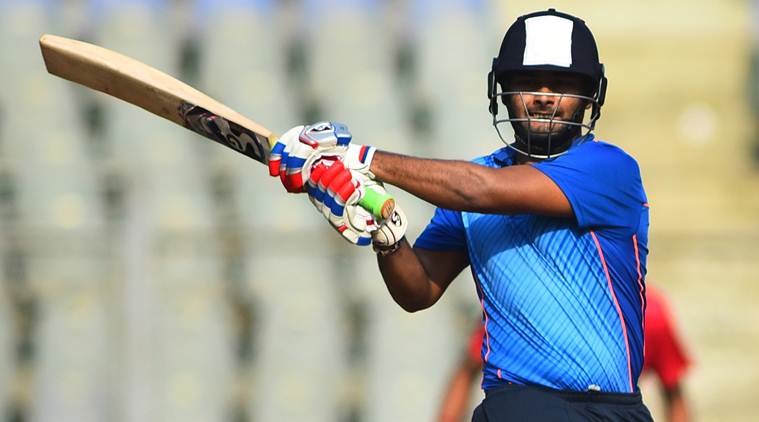
Rishabh Pant played for Delhi in domestic circuit. (Express File Photo)
He would wake up at 2 am, not to catch a bus this time, but to shadow practice. “Stance, grip – all that he told me to do. I would practice for hours before sleeping. Sometimes, I wouldn’t even go to sleep but keep doing this almost all night.”
A boy in the dark, literally and figuratively. Slowly some runs started to come in the middle but he wasn’t as consistent as before. “I thought kya yaar, what’s happening. Let me leave this cricket only. I wasn’t used to not scoring. But sir and something inside me said I can’t. Kuch karna hai.”
It took a year-and-a-half to two years for all the changes to become muscle memory. “Just as sir had said, when it happened, I didn’t even know. I can’t pinpoint a turning moment but it had begun to feel natural. Sometimes, people don’t realise the importance of a coach. I always call him, ustaad ji.”
The turning point came when he was playing U-19 for Delhi. “It was a game against Assam. We had prepared a grassy track thinking it would help us qualify for knockouts.”
WATCH | : Bharat Army with genius Rishabh Pant chant at SCG
It backfired as Assam scored 290 and Delhi collapsed for little over 100. Pant had top-scored with 35 but was severely reprimanded by the coach. “I had given my wicket away and my wicket led to a hat-trick. We collapsed. Bahut gaali mili!” Delhi were made to follow on. “I hit 150 in the second innings – that knock was the most important in my career. From then on, I have never looked back. People in Delhi cricket appreciated me and I would hear people talk about me.”
One of the goals he and his father had set was to play Ranji Trophy cricket before playing for India U-19. “Recognition after under 19 was easy, I knew. But I wanted to play Ranji first.”
It happened to great joy of his father whose delight would multiply after Pant’s success for India U-19.
******************************
The IPL came calling with a big pay packet. So did tragedy. His father never woke up one morning in April 2017. “It was a silent heart attack in the night. There were no health problems before that. Just the normal stuff with BP. We were shocked.”
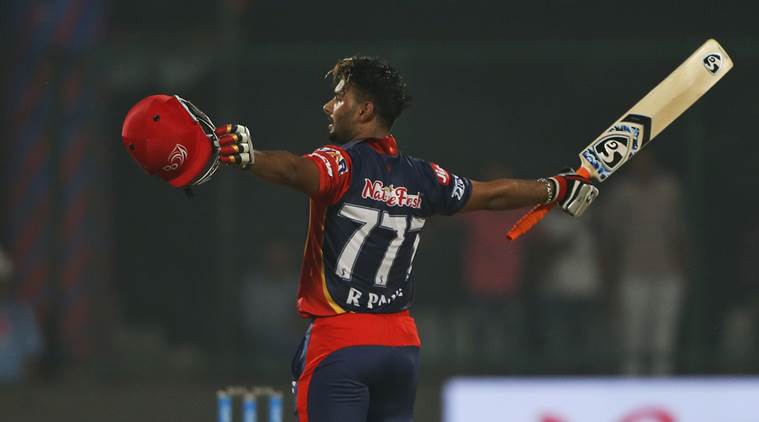
Rishabh Pant earned big bucks at the IPL. (Source: File)
One trait that Pant had developed in the days of struggle before – the Rajasthan fiasco, the panic after loss of batting form that made him think about quitting cricket, and the all the little setbacks while establishing himself in Delhi cricket circuit – was to keep his sadness to himself. He had developed a home-grown philosophy: “Dukh nahi baanta hai, sirf kushi (Don’t share sorrow, just spread joy). I would keep things to myself. Otherwise, I saw that my family was affected a lot. They had seen me as a little boy trying his best to make a name in cricket and would get really down with all the setbacks. So I started to keep the disappointments to myself. Family would feel sad, thinking chota bacha itna mehnat kar raha hai.”
It helped him, he says, in handling his papa’s death. “It was tough but mummy and sister had to be taken care of. Someone had to be strong and do it. Take responsibility. I had to do it. Mann halka sab apni taraf hi rakhta hoon. I do all that internally. If I too had broken down then, who would take care of my mother and sister? It was a life-changing moment for us; so I had to carry them through.”
It wasn’t just his father’s death but his mother too had health issues then, having undergone a surgery. At the funeral, his grandfather asked him if he wanted to play the IPL game, starting in a day in Bangalore. He said yes – that’s what my father would have wanted. Tarak Sinha and Devender Sharma, another coach of Sonnet Academy who has played a great part in Pant’s cricketing journey, also told him that he should play. At 8 in the morning, after the rites, he left for Bangalore to play.
“I am happy that papa saw me reach a place where he knew I would do well in cricket.”
There is one papa’s dream that he hopes to continue for the rest of his life. His school. “Papa and mummy started a school in Roorkee. For poor students, they don’t take any fees. Now my mother, who was a teacher, runs it.” Bored in Delhi, she moved back to Roorkee to the school. “Mann bhar jaata hai unka, khush rehti hai, aur kya chahiye, humey.”
******************************
Pant had one little wish for himself. A car. Not any car but an i20 in particular. “For some reason, I have always loved that car from childhood. Gaya hoga usmey, yaad nahi ab but all I knew was that it would be my first car. Even if I have 100 crores, I wanted to buy that. And so when money came through cricket, he took Devender Sharma, the coach, to a car dealer in Delhi. “Sharma sir called my mother and told her, ‘I am taking your son to get his car’. I remember the big keys he gave me at the shop. I was so happy.” As he would do later with the other fancier cars he has since bought, he drove his i20 straight to cricket ground.
“My family has never asked me about my money. They know samajhdaar hai (I am responsible) and that I wouldn’t waste the money. I know all this is just a by-product of cricket. My main focus is only on the game.”
He would drive down to Roorkee in his i20, no more buses and as it turned out, no more paneer paranthas. “We cricketers now have to be careful with our diet and exercise regimen. I can’t remember the last time I had paneer parantha.”

Rishabh Pant during his early cricketing days. (Source: Express photo)
It isn’t as boring a life as it seems. He loves trekking and still seeks out the hills of Nainital to clamber up. “My aunt lives there and I would go with my family or with two-three of my friends from my childhood. Same set of people. Har cheez purani hi hai apne pass – those are the people who supported me for years, how can I forget them? I have a small circle and I know who is important in my life. I just to try be happy and try to keep smiling.”
Treks helps, he says, in clearing the head. “There would be some normal route to go up, you discover or create the short-cuts through dense bushes and at times halat tight ho jaata hai but it’s all part of the fun. I just love it.”
******************************
Tim Paine, who had memorable on-field banters with Pant, would go on to say that he admires how the Indian ’keeper seems to have fun out in the middle. Something, he said, he couldn’t do when he was Pant’s age. Not just Paine, Pant’s demeanour has had the world talking. “Obviously nervous hota hai but my thing was that I shouldn’t show whether I am nervous or not. I remember Rahul Dravid would tell me, ‘stay the same way. Even if you do well or if you do badly, there is no need to change. Stay the same. I have tried to follow that. Ravi bhai (Shastri) has always backed me and given me great confidence.”
His team-mates too have been similarly helpful. During the Australia tour, Parthiv Patel and fielding coach R Sridhar kept working with him on the sidelines on his keeping. MS Dhoni has been generous with cricketing tips — like how the key to wicketkeeping is to keep the head and hands still.
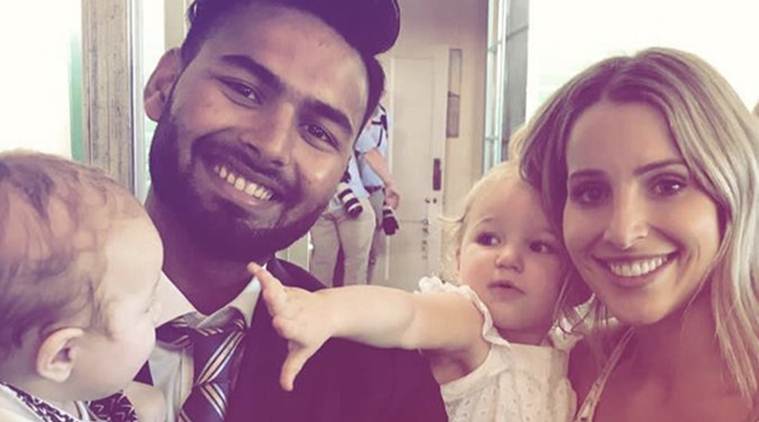
Rishabh Pant with Tim Paine’s wife and kids. (Source: ICC Twitter)
He then cues up a meeting at a hotel room with Virat Kohli. A night before the last day of the Test at Oval in England. “That night, he called me to have a talk. He said that it’s not compulsory that you have to play 30 matches or something to get experience. It can come in even two matches. Jo koi nahi kiya, tu kar saktha hai. Kuch likha thodi hai, if you are young, you can’t do it in Tests. That talk helped me a lot. For him to sit me down and make me understand things, was a very big thing for me.”
It’s to that viral photo with Paine’s wife and kid that we return. During the boxing day Test, after Pant was dropped from the ODI team, Paine sledged him by suggesting he should play for the Hobart Hurricanes during the Big Bash and added that if Pant had free time, he should baby-sit his children.
“I was standing there, in that function (a few days later at the Prime Minister’s house). Paine’s mother was there and she wanted a photo with me. I saw his wife standing with the kid and I asked her, “You want me to babysit your kid, I will do it! And she laughed and I held the baby.”
Pant says he tries to keep it light even during a game and does not worry about the last delivery — be it dropping a tough chance or a play and miss.
“As for having fun when I am in middle, if you don’t enjoy cricket, you can’t give 100%. Playing cricket for India is what my father wanted me to do. This is what my coach Sinha sir wanted me to do– even when I played my first T20 game, he said, ‘I don’t want you to be an international player, I want you to be a Test player’. And here I am playing for India – Why wouldn’t I enjoy doing it?”



